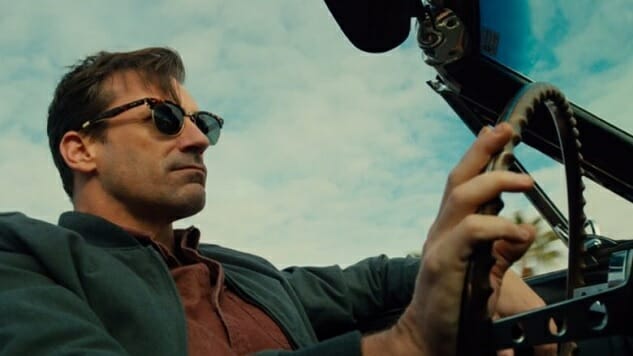Blandly directed by Mark Pellington, puzzlingly scripted by Alex Ross Perry and handsomely acted by its ensemble—though none of its participants are ever given enough space to fully feel out their characters—Nostalgia is a poor man’s version of other great movies built upon complexly interwoven narratives (a’la Magnolia). The film’s gaze restlessly glides from one story to another, creating a landscape of America’s present as shaped by the remnants of its past: We’re a nation attached to junk, Pellington tells us via Perry’s screenplay, as if our attachments to said junk link us to bygone days and thus satisfy our sentimental urges to revisit them, and hey, that’s the name of the movie.
Necessarily, Nostalgia sprawls. We start with Daniel (John Ortiz), an insurance assessor attending to the home of Ronald (Bruce Dern), a crusty old codger having a bit of a spat with his granddaughter (Amber Tamblyn) over his refusal to divest himself of the various bric-a-brac he has accumulated during the many years he’s lived in his overcrowded L.A. pad. We then follow Daniel to Helen (Ellen Burstyn), mourning the scorched rubble that used to be the home she made with her late husband for 30 years. From there we take a jaunt to Las Vegas, where Helen sells off the only valuable she took with her while her house burned, a baseball signed by Ted Williams that’s served as an heirloom in her husband’s family. It’s here in Vegas that the film enjoys a layover, latching onto the perspective of Will (Jon Hamm), a sports memorabilia dealer and the buyer for Helen’s baseball.
If Pellington (or for that matter Perry) felt so inclined, Nostalgia could have been all about Will, whose story isn’t exactly novel or exciting but nonetheless has ballast supplemented by a terrific troupe of actors. The Williams ball dealt with, Will hops in his car, because Hamm looks terrific driving on desert roads behind the wheel of a convertible, and makes his way to Donna (Catherine Keener), his sister, to help her clean out their old childhood home. Turns out their parents decided to downsize and hoof it to Florida, leaving Will and Donna to deal with what remains. Their sibling banter gives us an anchor, weighed down by baggage introduced in the film’s preceding chapters, as well as the characters’ inborn emotional stuff: Will isn’t the weepy type, while Donna waxes wistful about saying goodbye to the place in which they grew up.
There’s enough dramatic pull there to shape a narrative—why Nostalgia doesn’t is nothing short of baffling. The film places a heavy emphasis on Hamm’s scenes with Keener, as much in terms of their chemistry as the amount of material accorded them. Pellington demands we spend more time with them than with any of his other characters, which is fine. Their segment has the most going for it, after all. But the longer we linger in Will and Donna’s presence, the less purpose the anthology structure has, which in turn shreds every lofty overture Nostalgia attempts to make about universal human experiences. It’s not as if Pellington lacks forward momentum in Will’s story, either, couched in unexpected tragedy. You can picture a leaner, more focused version of this movie in an alternate timeline where Perry had bothered paring down his contributions.
Instead, Nostalgia is a mixed bag of college-grade philosophy, neither as meaningful nor as unique as it would like to be. There’s a way to orchestrate this kind of multifaceted narrative, a way to tie seemingly disparate parts together into one seamless packages. In fact there are several ways, depending on your preferred altar of worship, whether Paul Thomas Anderson, Terrence Malick, or Kelly Reichardt, whose Certain Women effortlessly achieves what Nostalgia struggles to with muted mastery. She sheds all traces of pretension and lets her revelations speak for themselves, confident her audience will listen. The mundane, she tells us, becomes extraordinary through a simple principle: Everybody weathers the same cycles of suffering and hardship. It isn’t coincidental. It’s just a hallmark of living.
By contrast, Nostalgia too often goes out of its way to wink and nudge at us by having its leads deliver protracted speeches colored by purple dialogue. We don’t need to connect the dots. The film does it for us. The craftsmanship here is so obvious that you might wonder if Perry and Pellington feel a little self-conscious about their message. It’s not that Nostalgia doesn’t have a grip on its subject. Rather, it’s too concerned that we might not get what it’s trying to say, and compensates by punctuating its epiphanies with exclamation points. “Lives are led,” Ortiz muses aloud before shuffling out of the movie. (Why couldn’t the movie have taken a ride along with him?) Like most of the film’s insights, his words ring with truth buried under an excess of pomp.
Director: Mark Pellington
Writers: Alex Ross Perry, Mark Pellington
Starring: Jon Hamm, Catherine Keener, John Ortiz, Ellen Burstyn, Bruce Dern, Annalise Basso, Amber Tamblyn, Mikey Madison, James LeGros, Nick Offerman
Release Date: February 16, 2018 (NY/LA); February 23, 2018 (Boston)
Boston-based culture writer Andy Crump has been writing about film and television online since 2009, and has been contributing to Paste since 2013. He also writes words for The Playlist,WBUR’s The ARTery, Slant Magazine, The Hollywood Reporter, Polygon, Thrillist, and Vulture, and is a member of the Online Film Critics Society and the Boston Online Film Critics Association. You can follow him on Twitter and find his collected writing at his personal blog. He is composed of roughly 65% craft beer.
